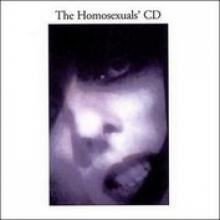In approaching the Homos recorded work, though, there are only two realistic avenues to tread upon – unless you have hundreds of spare dollars and enough time to hunt down those low run original releases. And considering one of the group’s releases subsequent to its demise is an 81 song box set, which by its pricing precludes it from most people’s collection, we’ll instead use The Homosexuals’ CD as a basis for the following dissection – well it wasn’t originally a cd, but ya know, we gotta work with what we’re given sometimes.
Anyway, the group is usually explained as an ensemble that attempted to disengage from the punk scene through the use of its name – before becoming the Homosexuals, they were simply christened the Rejects. Of course that may have caused some confusion considering the popularity of the Cockney Rejects, but the newly named band ended up losing its drummer as a result of the startling switch. In this calculated ‘departure’ from the punk scene the Homosexuals really seemed to still sound similar to some of the more thoughtful acts as opposed to the Exploited or whoever else was knocking about.
Wire and Gang of Four are generally the touchstones that get checked when attempting to draw up some crew of weirdos for the Homos to fit into. But Wire moved into much more ambient territory and while the Homos were capable of gettin’ funky, the really didn’t sound too much like the Gang of Four. Instead, Alternative Television seems to be the most sonically related to these folks. Both attempted to incorporate dubby bass lines while maintaining a razor thin sounding guitar and quick pace. Those same bass lines may have cropped up in the aforementioned groups but not in tandem with these other inclinations.
But to simplify a group that was able to cover so much ground only does them a disservice. The Homosexuals were as intelligent a group as their name was troublesome. Considering the group’s active disassociation with fame and or good fortune, it’s nothing short of miraculous that the music has made it through to this digital age. And while the Homos don’t really serve as an antecedent to any current movement, hearing them give it ago should inspire at least a few folks out there.
